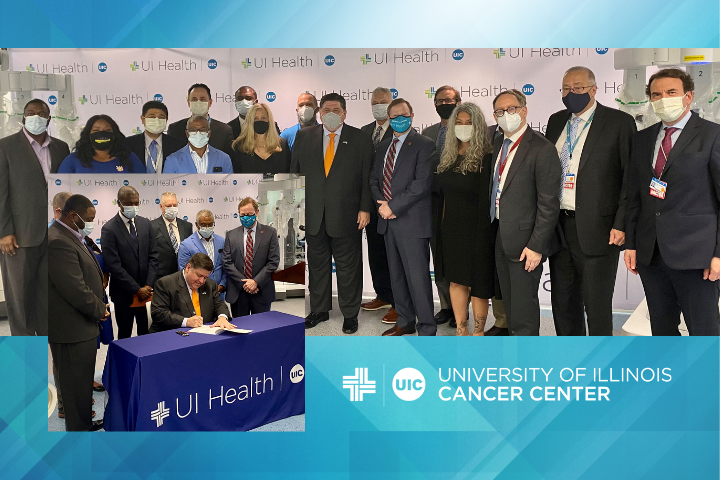
About 268,490 new cases of prostate cancer will be diagnosed in 2022, with about 34,500 men dying from the disease. It is the most common nonskin cancer among men in the United States.
In Cook County, which is part of the University of Illinois Cancer Center’s catchment area, Black men have a 70% higher prostate cancer incidence rate and 2.5 times higher prostate cancer mortality rate than white men, according to statistics compiled at the Cancer Center. The mortality disparity is the highest observed for any cancer site. This occurs despite similar rates of screening with the Prostate Specific Antigen (PSA) test in Black and White men. Hispanic men have the lowest prostate cancer incidence and mortality rates, as well as the lowest rates of PSA screening.
Earlier this month, Illinois Gov. JB Pritzker signed House Bill 5318, which requires health insurance and managed care plans to provide prostate cancer screenings without imposing a deductible, coinsurance, copayment, or any other cost-sharing requirement. The new legislation becomes effective Jan. 1, 2024.
“Preventative healthcare is the best healthcare of all, and it shouldn’t break the bank to access it,” Pritzker said at the bill signing held at UI Health’s Surgical Innovation Training Laboratory, 912 S. Wood St. “My administration is hard at work knocking down the walls that too often separate working families from their healthiest, happiest lives. In Illinois, we’re building the kind of healthcare system that people deserve because we know that healthcare is a right, not a privilege.”
About one man in eight will be diagnosed with prostate cancer during his lifetime, with an average diagnosis age of 66. Roughly six cases in 10 are diagnosed in men who are 65 or older; diagnosis is rare in men under the age of 40.
In March 2022, the University of Illinois Cancer Center’s Community Outreach and Engagement Office awarded a seed grant to Cancer Center members Angela Tyner, PhD, and Alan Diamond, PhD, to research the activation of the androgen reception by tyrosine kinases in prostate cancer.
In addition to his work with Tyner, Diamond is increasing his knowledge of the mechanisms of the gene SELENOF to develop a new therapeutic effective in treating prostate cancer.
“Diagnosing lethal prostate cancer and preventing death from the disease remains a major health care challenge, particularly among African American men who are at greater risk than Caucasians,” said Diamond, professor of pathology at the University of Illinois College of Medicine and member of the Translational Oncology program. “Natural variations in the gene of the tumor suppressor SELENOF are associated with increased risk of dying from prostate cancer, and these variations are 10 times more frequent in the genomes of prostate cancers in African American men.”
SELENOF levels are dramatically reduced in prostate cancer compared to benign adjacent tissue and the degree of loss is also greater in the prostate cancers of African Americans, Diamond said. A SELENOF translational repressor, elF4a3, is over-expressed in advanced prostate cancer, binds to the region of the SELENOF mRNA where the variation occurs and is targetable with an existing pharmacological inhibitor that results in enhanced SELENOF levels, he said.
“We believe that SELENOF is a novel tumor suppressor whose loss is a risk factor for advanced prostate cancer,” Diamond said. “Targeting elF4a3 will result in elevated SELENOF and reduce prostate cancer mortality. While SELENOF genotype may serve as a marker for increased risk of dying from prostate cancer, the existence of a targetable inhibitory SELENOF mRNA binding protein presents an opportunity to develop a unique therapeutic that would be beneficial in reducing prostate cancer mortality, particularly among African Americans.”
At the age of 48, Rep. La Shawn Ford (D-Chicago) was diagnosed with an aggressive form of prostate cancer. The disease was discovered when he underwent a routine colonoscopy, the procedure inspired by the death of actor Chadwick Boseman, who died of prostate cancer in 2020. Abnormal PSA levels led to Ford undergoing more testing, and eventually surgery. He was the chief sponsor of the bill.
“I know the personal cost of waiting too long to be diagnosed with prostate cancer – including more aggressive treatment, more side effects, and more anguish for a man and his loved ones,” Ford said in a press release. “For Black men especially, early prostate cancer screening and diagnosis can be the difference between successful treatment and a life that ends too soon. I’m proud to know that, because of HB 5318, the cost of screening won’t be a barrier for so many men in Illinois.”
